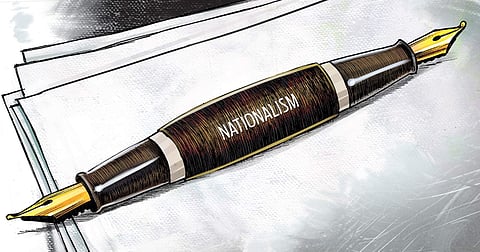

At a recent ideas conclave, I was asked to define “nationalism”. The word has been used (and misused) both by the Left and Right in today’s fraught political discourse to advance a specific ideology. But in its purest sense, as I told the audience, nationalism has nothing to do with ideology. It has everything to do with national interest.
One reason why the Congress, the Left and several other parties including the BJP have a poor understanding of nationalism is that they use European reference points. It is fashionable in the West and among India’s Westernised nouveau elite to say that patriots spread “love” and nationalists spread “hate”. But that is a Western postcolonial construct based on European nationalism that led to World War II. Indian nationalism is very different.
German nationalism in the 1930s, for example, sought to invade and conquer. Indian nationalism under Mahatma Gandhi in sharp contrast was non-violent and sought to free India from British colonial occupation which, like German ‘nationalism’, was invasive, violent and expansionary.
German and British nationalism of course were not nationalism at all but jingoism. Employing a deliberate sleight of hand, the Left attempts to discredit Indian nationalism today by conflating it with European “nationalism”.
In India, ideologues on the Right make a fatal error: they conflate nationalism with Hindu nationalism. It is not. In its truest form nationalism is inclusive. To protect the national interest means protecting every Indian’s national interest: Hindu, Muslim, Christian or Parsi; rich or poor; Brahmin or Dalit; Sunni or Shia; male, female or transgender. Nationalism seeks national advancement but not at the cost of other nations, races or creeds.
Real nationalism is fair, open and embraces diversity. It seeks to guard India from terror, promote the country’s economic interests by globalising the Indian economy and protect the rights of minorities by empowering them.
So why has nationalism attracted so much odium? Last week, at the Congress’ Foundation Day, party President Rahul Gandhi attacked the BJP for endangering the Indian Constitution. He was alluding to Union Minister Anantkumar Hegde’s comment (later retracted in Parliament) on changing the Constitution by removing the world “secular” which Indira Gandhi had inserted during the Emergency in 1976.
Rahul said India’s Constitution was “under threat” from the BJP. Irony is a strange affliction: it didn’t strike Rahul that the Constitution is a living document and that his own party, the Congress, has amended it over 60 times. The words “secularism” and “socialism” did not find their way into Dr Babasaheb Ambedkar’s 1950 Constitution. They appeared 26 years later for political reasons when the country was being subverted under a draconian Emergency imposed by Rahul’s grandmother, Indira. The Emergency threatened the Constitution far more severely than anything the BJP has done in its nine-and-a-half years in office under Prime Ministers Atal Bihari Vajpayee and Narendra Modi.
Rahul also said the Congress “stood for truth”. He should begin by acknowledging the truth about the “threat” the Congress posed to the Constitution not only during Emergency but also by its reckless use of Article 356 to impose President’s rule on inconvenient Opposition-ruled states at least 64 times since Independence, starting with Kerala in 1959.
Meanwhile a BJP MLA recently said, “Hindustan is for Hindus”. This is deplorable and symptomatic of extreme right-wing jingoism. They represent a fringe view that subverts real nationalism. The prime minister must condemn them swiftly and unequivocally. They damage the cause of Indian nationalism and do nothing to advance national interest. All Indians—Hindus, Muslims and Christians—are Hindustani civilisationally, geographically and genetically. The Right must understand this. Indian nationalism has only a national identity.
In its latest issue, The Economist devotes several pages to an essay on nationalism and what it means to different nations and peoples at different times in their history: “Thinkers like George Orwell and Elie Kedourie have argued that patriotism —tolerant, welcoming and reasonable—really has nothing to do with nationalism. It is a comforting thought; it separates decent people from the bigots who cling blindly to their own nation’s superiority.
But one person’s patriotism is another’s prejudice. In 1917 the Indian writer Rabindranath Tagore lamented how ‘the people which loves freedom (the British) perpetuates slavery in a large portion of the world with the comfortable feeling of pride in having done its duty.’ Genial English patriots were blind to the harm they caused.”
Colonial British “nationalism” was neither patriotic nor nationalistic. It was jingoistic. So was the fraudulent nationalism of Lenin, Stalin and Mao which India’s Left, even today, unthinkingly embraces.
Like secularism, India’s definition of nationalism is shaped by history. During the freedom struggle, Gandhiji’s nationalism was noble. Today, Indian nationalism has fallen victim to chicanery. In order to rescue it from the morass of the subverted definitions it has attracted, focus on three non-negotiables. One, nationalism is open and welcomes diversity. Two, it is non-aggressive and non-expansionary unlike European nationalism. And three, it protects India’s national interest.
Rahul would do well, as he prepares for a rigorous election season that lies ahead, to expand his reading of Tagore. This great Indian nationalist saw nationalism as the embodiment of the idea of India: plural, democratic and tolerant. That is what every true Indian nationalist should stand for.
Minhaz Merchant
The author is an editor and publisher
Email: mmleditorial@gmail.com